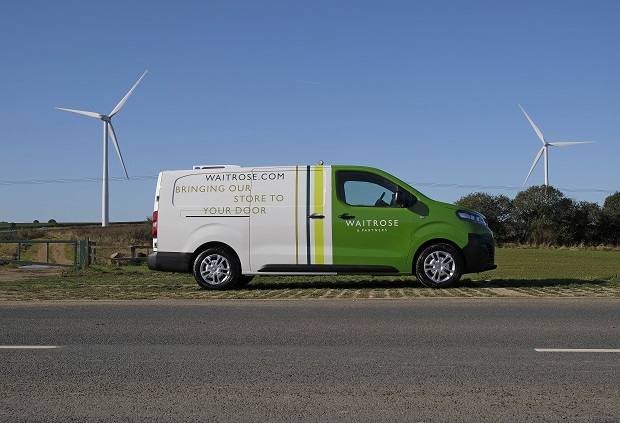Waitrose is to become the first supermarket in the UK to trial a new generation of electric vehicles
 Following a significant investment, groceries from Waitrose’s St Katharine’s Dock store will be delivered to customers entirely by electric vans equipped with cutting edge wireless charging technology – putting the supermarket at the forefront of green home delivery when the trial commences in the New Year.
Following a significant investment, groceries from Waitrose’s St Katharine’s Dock store will be delivered to customers entirely by electric vans equipped with cutting edge wireless charging technology – putting the supermarket at the forefront of green home delivery when the trial commences in the New Year.
The move follows an ambition* to end the use of fossil fuels across Waitrose’s entire transport fleet by 2030 – estimated to save 70,000 tonnes of CO2 every year, and comes as world leaders gather in Glasgow for the COP26 Climate Conference.
By 2030 we’ll have electrified all cars, vans and light trucks, and for sectors where that is not currently possible, such as long distance heavy trucks, we’ll be using biomethane. We’ll reach 340 biomethane trucks in the next few months, and by 2028 all 600 heavy trucks will be running on biomethane.
The future of electric is wireless:
Wireless vans are fitted with a slim charging pad on the underside and simply top up by parking above an electric plate, exactly like flat charging plates for mobile phones. They can also be plugged in to charge overnight.
The technology is installed by EV technology specialists Flexible Power Systems, which also equips the store with a cloud based smart charging system designed for home delivery.
The vehicles will be delivering groceries over the coming months from the St Katherine’s Dock Waitrose store in London and are expected to be expanded in the near future.
The trial builds on a deployment with City of Edinburgh Council and Heriot-Watt University in Edinburgh, funded by the UK Government’s Office for Low-Emission Vehicles through its innovation agency Innovate UK.
Marija Rompani, Director of Ethics & Sustainability at the John Lewis Partnership, comments: “Before the pandemic, we were taking 60,000 orders a week – we’re now doing well over 200,000 orders. That uplift in demand for grocery deliveries means that prioritising an electric fleet is more important than ever, particularly as world leaders meet at COP26 to discuss how we lower global emissions.”
“We’ve already committed to electric vans and have created a new biomethane gas filling station too, which is helping to reduce CO2 emissions by 80%. We continue to look for new innovative ways to cut our emissions even further, as well as bring in the latest technology. Being the first to trial this new wireless charging technology is both exciting and another example of our ambition to show leadership in this space.
Managing Director of Flexible Power Systems Michael Ayres says: “Companies like Waitrose have to electrify their fleets to combat climate change. At the same time, they have to fulfil customers’ needs as efficiently as possible, and the growth in home delivery seen during the pandemic is here to stay.
“This project is about testing technologies that can save time and cost, particularly wireless charging, which has the potential to save time spent charging between deliveries to make the process more efficient and convenient for customers, as well as retailers.”
Transport Minister Trudy Harrison said: “I am thrilled to see Waitrose leading the way by making the important switch to electric vans, offering green deliveries to thousands of customers, as we accelerate towards a net zero future.
“This Government has committed £2.5bn towards electric vehicle grants and infrastructure and I am delighted to hear that Flexible Power Systems have been able to develop this cutting edge wireless charging technology with the help of DfT funding.”
For further information, please contact: matthew.clemens@waitrose.co.uk




Comments are closed.